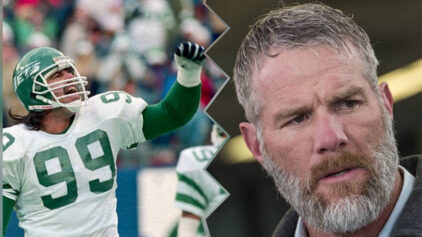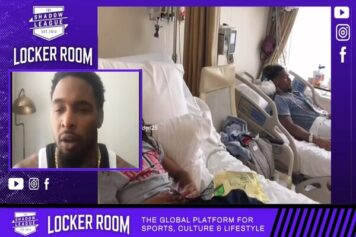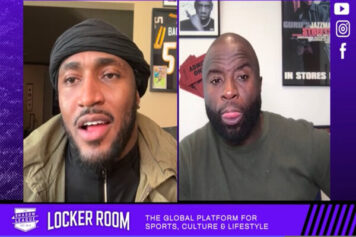The final minutes of "Broke" are the most revealing of the ESPN “30 for 30” documentary. One hour and 15 minutes into a piece of work that is largely a rehash of already told stories, a who's who list of professional athletes scrolls across the screen like film credits. And in a sense they are credits; a list of well-known professional athletes who are the backbone of and reason for the making of this sad tale.
From the "A" of former Georgia Tech and NBA star basketball player Kenny Anderson, to the "W" of former Major League Baseball pitcher Rick Wise, the 56 men and two women – women's basketball great Sheryl Swoopes and ice skating icon Dorothy Hamill – a point of singularity. All 58 have filed for bankruptcy.
As a story that chronicles the rise and fall of myriad pros, "Broke" walks a well-worn path. The stories told involve headline-making athletes whose feats on their fields of play are often the stuff of legend, turned headline-making financial horror stories. The tales are reiterated largely with the same callous disregard for the subjects as they were when first told in your local or national newspaper or sports news magazine. Those intrepid, foolhardy, or arrogant enough to be interviewed for the camera – Keith McCants, Andre Rison, Curt Schilling, and Bernie Kosar, to name a few – all tell relatively the same story.
There is the "rookie" or 'big" bonus tale, the one that brought a wry and knowing smile to every athlete's face. The tales include the telling of young men who never dreamed their feats on the field or court would allow them the ability to spend $100,000 on a single gold chain, or spend $106,000 in one month on a Black American Express card that arrived in a "James Bond briefcase," or spend $56,000 on a restaurant bill, or flick so many $100 dollar bills from hand over railing and onto the commoners below that the act is no longer called "making it rain" but making it – "snow."
There is the story of cashing a one million-plus dollar bonus check… in 20 dollar bills; taking that money and throwing it on a hotel bed with the athlete thinking he will never be able to spend all those twenties. There is the story about seeing a teammate walk into a locker room with a new diamond encrusted, gold monstrosity that passes for jewelry and, as a retort, another teammate purchasing a new Ferrari, pulling it conspicuously into the player's parking space as an "in your face" gesture to the teammate who purchased the comically over-the-top, “too many diamond carats for 20 pieces of jewelry” gold necklace. Each tale is accompanied by upbeat music and glitzy photos from the athletes' halcyon days of youth and all the accoutrements of the newly-minted rich and famous.
There is the tale of woman after woman after woman that, in every case, amounts to too many women and no love, but always results in children and monthly child support payments that nearly equal a month's worth of paychecks.
Every story turns predictably somber and sad. Bernie Kosar tells of paying a million dollar to keep his father at arms length. Curt Schilling tells of spending $35 million of his own money to start a video game-making company that never produces one game. Andre Rison tells of Lisa "Left Eye" Lopez burning down his multi-million dollar home. Bart Scott tells of paying mortgages on 24 homes. Many players tell of living paycheck to paycheck during the season, and being nearly or totally broke by the time they must report to their teams the following season.
——————————————-
Despite the financial consultants and lawyers who were interviewed for "Broke" providing viewers with insights into the environment in which athletes must navigate, it is easy for pro sports fans to feel that there exists more than enough horror stories that should act as cautionary tales for all pros. Even when the sharks come dressed in $1,000 suits and appear to be legit, most fans feel athletes should be savvy enough to seek help through the various league offices.
"Broke" does, hopefully once and for all, through its inclusion of Kosar, Schilling, and Sean Salisbury, explode forever the too-widely held notion that athletes losing all their money is exclusively a black athlete problem. This element of the documentary cannot be underestimated, as it is one of its most important and overt statements.
But here is where "Broke" reveals its true story – albeit inadvertently.
What “Broke” really is, is a story about America. And "Broke" exhibits the painful truth that all but the wealthiest of Americans are expendable. That we are expendable is, in the case of "Broke," explained through professional athletes, even those with successful post-pro sports careers like former 11-year NBA veteran, Jamal Mashburn, who owns several successful auto dealerships and restaurants. Had Mashburn's mother not instilled in him the importance of self-sufficiency, he too would likely be much less well-off post-career than he is now.
Financial advisor Ed Butowsky, who was interviewed for "Broke," intimates that America's colleges and universities utterly fail to prepare students – and particularly athletes who may become wealthy overnight – to deal productively with their finances. How is it possible – in a country where we must attempt to save and earn interest on as much money as we can in order to not only provide for ourselves and our families, but also to live comfortably in retirement – that a rudimentary understanding of economics and finances is not taught at the vast majority of high schools and colleges? Apparently, the less we understand about economics, the greater the chance that we cannot grasp the methodologies behind one or any of the myriad financial scams that continues to take place within our financial institutions. And the greater the chance exists that we will remain partially, or wholly, dependent on our government or private financial institutions for financial aid.
Butkowsky also informs viewers that most Americans begin their financial earning years in their 20s. They most often settle into their jobs and begin their upward earning curve in their 30s. Their highest earning years and years having gained the most experience in how to grow their money comes in their 40s and 50s. Athletes' biggest earning years, on the other hand, comes in their 20s. As Butowsky related, what average 20-something year old has enough knowledge of economics and finances to properly manage millions?
What we come to learn through "Broke" is that players they pay live paycheck and have too many "advisors" in their ear who haven't the expertise to help them "live like princes" for the remainders of their lives, rather than "live like a king" for one year.
Imagine a world where Dallas Mavericks owner Mark Cuban or New England Patriots owner Robert Kraft, walks into their respective locker rooms, each season, and gives each player a choice of finding their own way to grow their salaries or informs them that they can walk into their offices and get sound advice on saving money from two of the nations' most successful investors.
Through "Broke" we learn that, offered the soundest advice, a young man or woman is as likely to ignore the offer of procuring a comfortable future as they are to taking an owner's financial advice; that they will not apply the same measure of discipline they used to reach the pinnacle of their respective sports to their financial futures.
Ultimately, "Broke" serves as a clarion call to team owners and their leagues to double down on their efforts to, if necessary, shepherd young athletes to a promised land of success on and off the field of play.
A prime example of this shepherding is the recent case of Dez Bryant, he of the $56,000 restaurant bill. Dallas Cowboys owner Jerry Jones, seeing the potential in Bryant becoming a lynchpin in the Cowboys on-field success and knowing his considerable financial investment in Bryant, laid down the following "Jerry Rules" for his troubled star wideout. The rules are as follow: a midnight curfew, and, if the curfew is to be broken, the Cowboys brass must be informed in advance; no drinking alcohol; attending nightclubs pre-approved by the team; twice a week counseling sessions; be accompanied by a three-man security team at all times, and be escorted to all practices, team meetings, and team functions by the security team.
Yes Bryant must pay for the security out of his own pocket. But that expenditure is far less than Bryant's strip-club tsunami's, or his restaurant and nightclub end-of-evening tabs.
And the expenditures are far less than the cost of losing his career – and potential unfulfilled.
("Broke" airs on ESPN Tuesday evening at 8 p.m. EST)



